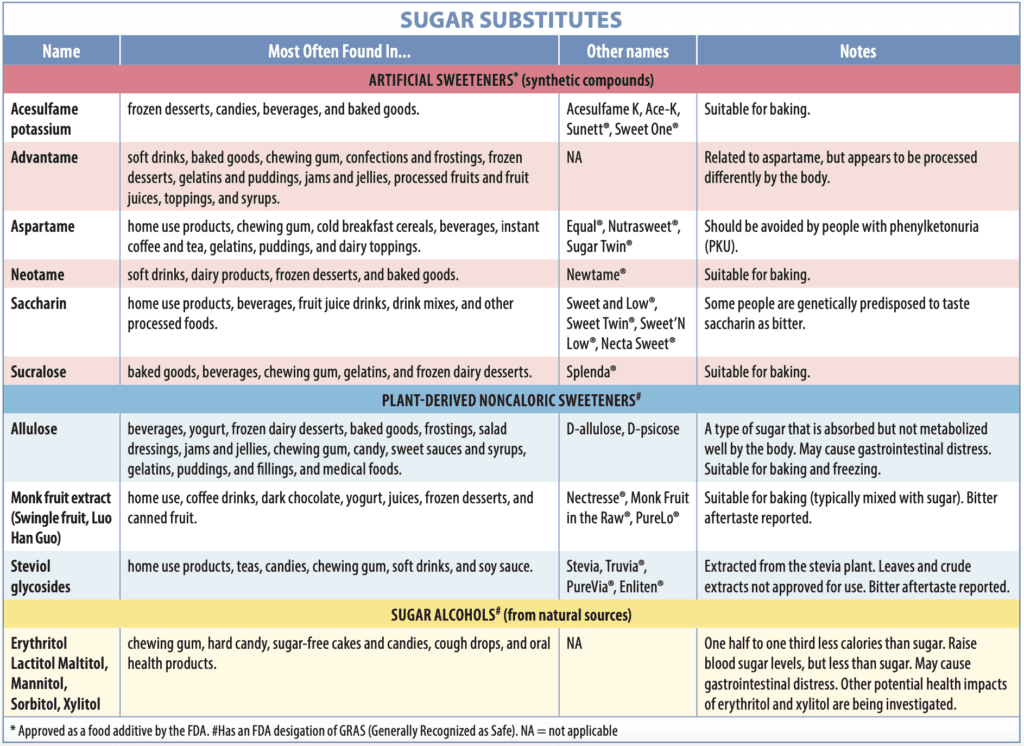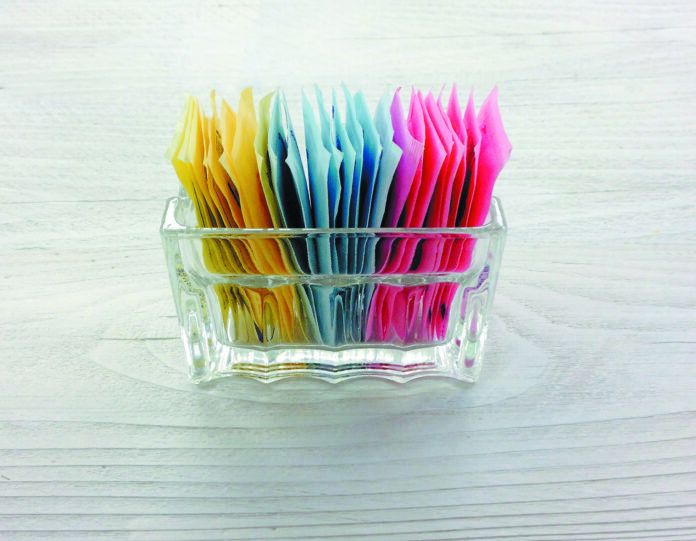If you’ve eaten sweet-tasting products labelled “sugar-free,” “low-sugar,” or “diet,” you’ve likely eaten sugar substitutes. These non-caloric or low-calorie artificial sweeteners, plant-derived noncaloric sweeteners, and sugar alcohols are most often found in soft drinks, snack foods, sugar-free candies, gum, and sweet dairy products. For more information, see the “Sugar Substitutes” table.
Sugar substitutes don’t raise your blood sugar or cause tooth decay the way sugar (sucrose) does, but that may be the extent of their health benefits.
Health Impact. Sugar substitutes are typically used to replace sucrose in processed foods. “The consumption of sugar-sweetened foods (and beverages in particular) has been consistently linked with increased risk for a number of disorders,” says Alice H. Lichtenstein, DSc, Gershoff Professor at the Friedman School and editor-in-chief of this newsletter, “including type 2 diabetes, coronary heart disease, hypertension, excess body weight, and possibly even frailty. Use of beverages and foods made with sugar substitutes, if successful in reducing the intake of added sugars, could result in health benefits. However, the jury is still out on how successful their use is in accomplishing this goal and what the health impact will be.”

Dental Health: It is generally accepted that replacing sucrose with sugar substitutes reduces the risk of developing cavities. Some data even indicate that the sugar alcohol xylitol in chewing gum may play an active role in cavity prevention.
Weight Loss: It’s difficult to determine if sugar substitutes help with weight loss. Long-term studies are lacking, but short term randomized controlled trials (which can establish cause and effect) have shown that providing beverages sweetened with sugar substitutes in place of those sweetened with sucrose has a beneficial effect on body weight. But in one trial, a beverage sweetened with the artificial sweetener sucralose was reported to increase food cravings more than a sugar-sweetened beverage, especially in women and people with obesity.
Some observational studies (in which researchers compared people’s reported food intake to their weight) have suggested that consumption of foods made with sugar substitutes may actually be associated with higher body weight. “However, these studies cannot determine whether the sugar substitutes themselves lead to excess weight gain or if individuals with overweight or obesity are just more likely to choose products containing sugar substitutes,” says Lichtenstein. “Additionally, if low-sugar or sugar-free products are added to a high calorie diet, rather than replacing sugar-containing products, weight loss will not occur.”
Diabetes: If cutting calories by using sugar substitutes does lead to weight loss, it could help treat or decrease the risk of developing type 2 diabetes. Additionally, sugar substitutes raise blood sugar levels much less than sucrose—if at all. The American Diabetes Association cautions that some research indicates even sugar substitutes may be associated with some rise in blood sugar. “Foods and beverages made with sugar substitutes are a better option than those with added sugar for people with diabetes,” says Richard Siegel, MD, co-director of the Diabetes and Lipid Center at Tufts Medical Center, “but I encourage my patients to focus on nutrient-dense foods, like fruits, vegetables, and nuts instead of low-calorie or low-sugar versions of cookies and candy.”
Even if foods made with sugar substitutes do have some health benefits when used in place of sugar-sweetened foods, Lichtenstein says it’s best to limit their intake anyway. “Foods containing these compounds are almost always ultraprocessed,” she says, “and we know dietary patterns high in ultraprocessed foods are associated with negative health outcomes.”
Safety Concerns. There is a large body of research looking at potential health hazards from consuming sugar substitutes, but there has yet to be any conclusive proof of danger from any products currently on the market.
Plant-derived noncaloric sweeteners (sugar alcohols, stevia, monk fruit extracts, and allulose) fall under the U.S. Food and Drug Administration (FDA) category “Generally Recognized as Safe,” or GRAS. This means experts have concluded that the substance is safe under the conditions of its intended use in the quantities typically consumed.
Artificial sweeteners (synthetic, or man-made, compounds) are regulated as food additivies and must meet a higher standard of proof of safety. The FDA establishes an acceptable daily intake (ADI) level for all artificial sweetners. An ADI is the amount of a substance that is considered safe to consume each day over the course of a person’s lifetime. Artificial sweeteners are 200 to 20,000 times sweeter than sucrose, so very little is needed to make foods taste sweet. Even people who consume a lot of these man-made sweeteners are unlikely to exceed the ADIs.
Cardiovascular Disease: Recent studies involving participants in the U.S. and Europe found that high blood levels of the sugar alcohols erythritol and xylitol were associated with increased risk of heart attack and stroke, but these findings need confirmation. At this time, there are no established links between sugar substitutes and cardiovascular disease.
Cancer: Federal legislation prohibits the approval of any compound established to cause cancer. Overall, the results of the large number of studies looking for a link between sugar substitutes and cancer have been inconsistent. A 2023 review that looked at all available data concluded that evidence associating artificially sweetened beverage intake with cancer was weak. An observational study published in 2022 found the highest reported intake of artificial sweeteners was associated with a small increase in cancer risk compared to the lowest reported intake. While there is limited evidence (not convincing) that aspartame may increase cancer risk, experts agree this artificial sweetener is likely safe at the levels at which it is typically consumed.
Looking at the body of research to date, sugar substitutes (in reasonable quantities) appear to be a safe alternative to added sugars, and may reduce tooth decay and help manage blood sugar levels—but the truly healthy choice is to cut back on ultraprocessed sweet foods. Drinking mostly water and getting one’s sweet fix from nutrient-packed fruits is truly a “sweet” choice.
➧ Eat Naturally Sweet Foods. Consuming fruits (and sweet veggies) is associated with beneficial health effects, and these foods come with essential nutrients. Choose them over ultraprocessed foods—even those with no sugar. ➧ Look at Labels. Words like “diet,” “sugar-free,” “low-calorie,” or “reduced-calorie,” typically indicate the presence of sugar substitutes. Limit these foods if they are ultraprocessed. You can confirm by reading the ingredient list.
➧ Drink Water (and unsweetened coffee, tea, and seltzer). For those who find it hard to give up sugar-sweetened beverages, a switch to beverages sweetened with sugar substitutes will help cut health-damaging added sugars while you work to wean yourself off of sweet drinks.
➧ Limit Sugar Alcohols. In some people, high intake can cause cramping, gas, and diarrhea. The amount that can be tolerated without ill effects varies from person to person. “Sugar Alcohol” should be listed under “Total Carbohydrate” on Nutrition Facts labels and the specific sugar alcohol will be listed on the ingredients.





















